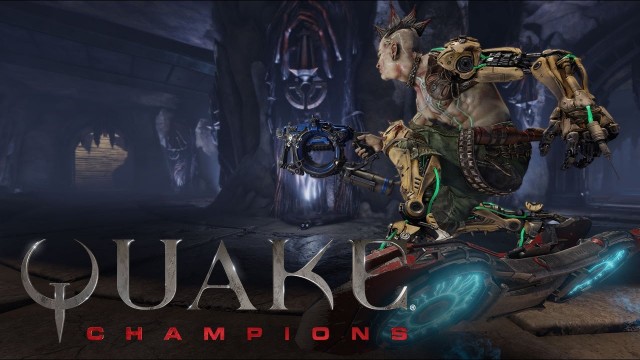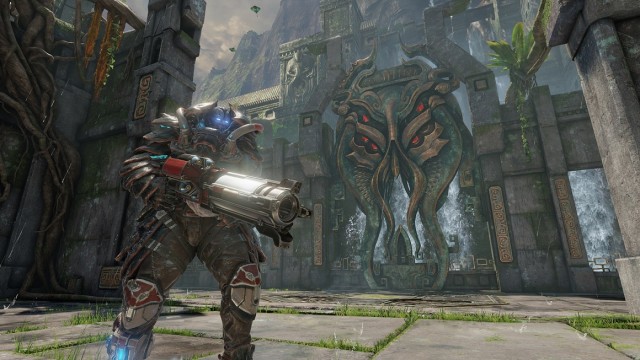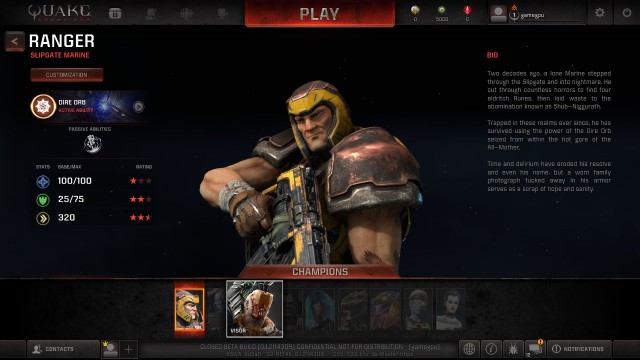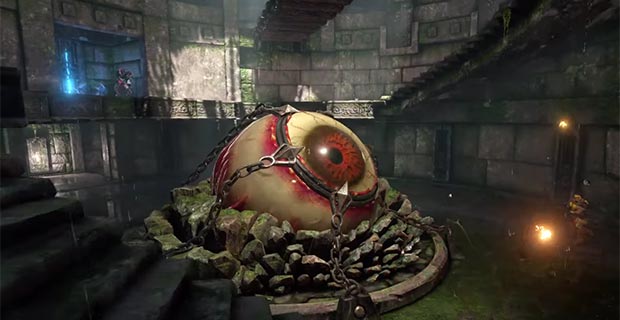Name: Memento_Mori
Location: Zurich
Posts: 4981
Location: Zurich
Posts: 4981

The Product
We will talk about the actual gameplay later, but for now, letís look at what QC has as product that its predecessors did not:
- E-Sport Support. One could say this is due to Zenimax/Bethesda buying id Software, and possibly a strategy about how to make the best of id Software intellectual properties Ė ex: make doom great single player and make quake a great esport + free to play. Regardless of why, this kind of support is unprecedented in Quake. No prize purse has been announced yet, but it might well be a good surprise for many. Besides big cash tournaments, e-sport support means resources spent into developing spectator features, marketing the events, etc. This is an area where previous Quakes had very little support.
- The Free to Play Model. If youíre anyways like me, you wonít like it a priori (and will buy the champion pack), but for the devs and for the future of the game, this model makes a lot of sense. The basics of it are: you make the entry level free, and you will always assume most people never spending a dime on your game. These players exist to increase the popularity of the game, spread the word, and make the game experience more viable to everyone (better match making, etc). You then have the fans, and especially the super fans, who are the one paying for stuff, at times even a lot of money. And of course, you try to make your best to convert free players into paying ones. The more your game picks up, the more money you make in time, which means you can sustain it and grow. Itís like a subscription model in this regard, but has a much more granular payment system, and zero entry barrier. Past the access to all champions, purchases will only affect cosmetics, without altering the gameplay.
- Champions / Drafts / Unique Abilities I believe this aspect is more about the spectacle of the game, rather than a super-deep effect in the metagame (it might matter in the end, but itís too early to say). But one traditional problems in Quake as a spectators experience has been the lack of explicit elements to look at and talk about. Expert quakers may not care and would likely mute commentators anyways unless itís joe and 2gd. But for novel spectator, this stuff is necessary. Words fail at quickly and properly describe the thousands of minute details that make a specific position or move good or bad, so commentators are left with little to say and have to look for explicit things. I see champions and ultimates being a thing to talk about, during drafts, during the evolution of a duel, etc. It might well be that in reality those are not the things that make you win, but the spectacle is rarely about that.

The Gameplay
While this is still a beta, and nothing is ever final, the game has changed, and depending how fixated one is on specific points, it may feel like a big departure from the past.
My personal experience is that figuring out how a game plays on paper is very hard, especially if there are many elements to them. At times, just a little change can lead to very surprising results. Trying to be fair here, and sticking to mere observations, I made two lists.
This is where I feel QC matches the previous Quakes:
- Momentum-base Gameplay. The speed cap on champions may make you wanna flip the table, but from what I've seen so far, building and using momentum is still the core of the game. If you manage to go fast, you can use it to your advantage, and itís fucking cool. Was watching Fazz streaming on the weekend, and he was speeding around using Anarki, and it looked amazing and exciting (even when his running was not always optimal). To me this is the true core of what makes Quake Quake, and itís very important it stays.These are the main things removed or changed:
- Weapons/Items/Powerups. Itís kind of obvious, but also quite important. Itís the quake stuff, with some different flavor here and there, but no major upsets. I personally welcome the increased relative strengths of weapons vs stack (either due to more damage output or to less stack). Quad is back to 4x, you can get 1 hit kills more often, etc. This may feel odd coming from QL, but Iíd say earlier Quake used to be more like this, and generally, it just mean execution has a bit more relevance compared to control, and this is not the end of the world.
- Combination of movement Systems. Rather than proposing a new movement system, QC champions offer different options from previous Quakes. This is not solving all the problems related to movement (see below), but for non-competitive play, this means you can pretty much pick the style you like, and have fun with it. Competitive play is likely more down to the actual effectiveness of each champion, but if you compete, chances are you know all movement systems anyways.
- Classic Game Modes. Itís unclear what of the classics will be available at launch, but I suspect that the changes that are happening across the whole gameplay may mean that the classic modes no longer make sense, primarily duel.I probably have missed some things, but these were the most important point for me. With these points out of the way, let's talk about how this game can grow.
- Item timings. Health and armor are now on 30 sec. With classic game modes, such a change would have very nasty consequences, such as dudes running around the map pac-man mode and bullying their opponents indefinitely. Thing is, the new modes are different. The chemistry Ė due to champions and their abilities - is different.
- Weak after Spawn. In previous quake, you are cannon fodder after spawning. Here, you are a champion with a charged ability. One that might give you a free escape ticket, or insta-kill a careless attacker.
- Health System. For reasons that are beyond my current understanding, things have become more complex in this department. I can see this being an attempt to mud the waters and make it harder to know who much health opponents have, but I canít figure out why that would be a good idea in the first place. I feel Iím missing how this fits into the big picture.

Game Growth
For the sake of discussion, letís imagine the following strategies.
1. Going Big Fast. This is Bethesda/id Software putting loads of cash into the tournament, spread the word, and try to get as much exposure as possible to the game. This would be unprecedented for Quake, but itís not too crazy given the premises of QC.It's unclear where id Software stands right now, but if I had to make a guess, I imagine the former more than the latter. And they are not necessarily to blame. They might consider Quake a grown-up game, they might want to surf the big wave of Bethesdaís support, and try to establish QC as one of the big e-sports out there. It's good and it may work.
2. Growing Carefully. On the other side of the spectrum, the idea here would be to prove that you can beat the retention first, and once you know you wonít lose newbies like leaves in autumn, push to grow the game. It means a bit of a shift of priorities, from spectator friendly / e-sports to retention features.
My main worry is that Quake may not be as 'grown up' as one could think. Player retention is a department where the game has always been suffering. While, the free to play model and the e-sport support are all about outreach (and they could potentially attract *many* new players) the real question is what is there in QC that will make the new blood stay. Previous iterations have failed at this, and besides some minor differences due to the different point in history, pretty much all Quakes lost most of their players fast. So why should it be different this time around?
Rooting the success or failure of a game to one feature is probably crazy, but I consider the movement of quake its blessing and curse. Quake without strafe jumps & co would not be Quake. Once you know how to move properly the game opens up to you, and you start to be capable of glorious actions that are the reason why people stick to the game. But learning to move properly is a big effort.Not only that, it does not come natural in the game. QL presented you with a training session that hints you need to learn how jump past a large gap, but the process of sitting down and practicing a smooth mouse turn with the right key presses is a process that one has to self impose. But for people to show this dedication, they need to be hooked already, and chances are, they are not at this stage.
As of now, thereís no indication of serious efforts in QC to teach the movement. This might well be something they addressed and we just havenít seen the content yet. Or they might have ignored it (as it was ignored in all previous Quakes), and I think this will bite back.

Outlook
Soon we should learn more about the growth strategies for the game, the prize purse for Quakecon, as well as all the other features that were not shown in the beta.
I expect the first months of QC will be quite hot. Top players will want to learn the game as much as possible, qualify their teams, fly to Dallas, and win some big cash, and this process alone, in conjunction with streaming, should create an interesting show. It will also be a proving ground for the new modes. The new duel might be one of those things that turn out to be a disaster or a pleasant surprise, but for sure it's something different, and it's still interest to see what top players will pull out of it.
The real question to me is what happens after QuakeCon 2017. Will this Quake be able to succeed where all previous Quakes have failed? Will the new blood find a place where they can have fun and stay? And what has QC to offer them, as they grind their way through learning the way of Quake? Time should tell us... pretty soon.
Edited by Memento_Mori at 11:15 CDT, 17 May 2017 - 60185 Hits

